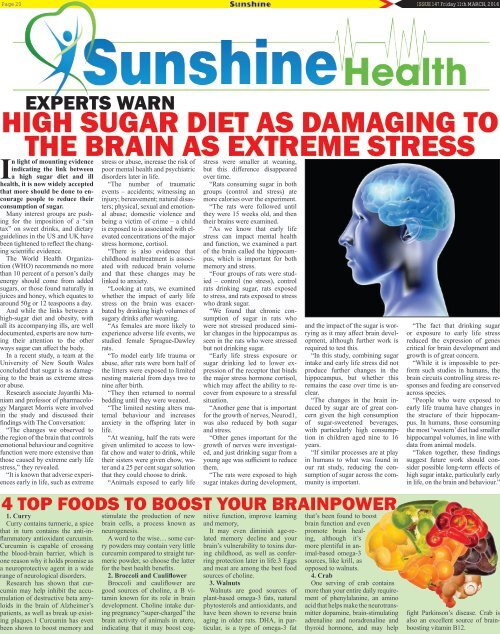RENTAL DEAL!
13oBuOATS
13oBuOATS
Create successful ePaper yourself
Turn your PDF publications into a flip-book with our unique Google optimized e-Paper software.
Page 20 ISSUE 147 Friday 11th MARCH, 2016<br />
EXPERTS WARN<br />
HIGH SUGAR DIET AS DAMAGING TO<br />
THE BRAIN AS EXTREME STRESS<br />
stress or abuse, increase the risk of<br />
poor mental health and psychiatric<br />
disorders later in life.<br />
stress were smaller at weaning,<br />
but this difference disappeared<br />
over time.<br />
“The number of traumatic “Rats consuming sugar in both<br />
events – accidents; witnessing an<br />
injury; bereavement; natural disasters;<br />
physical, sexual and emotional<br />
abuse; domestic violence and<br />
being a victim of crime – a child<br />
is exposed to is associated with elevated<br />
concentrations of the major<br />
stress hormone, cortisol.<br />
“There is also evidence that<br />
childhood maltreatment is associated<br />
with reduced brain volume<br />
and that these changes may be<br />
linked to anxiety.<br />
“Looking at rats, we examined<br />
whether the impact of early life<br />
stress on the brain was exacerbated<br />
by drinking high volumes of<br />
sugary drinks after weaning.<br />
“As females are more likely to<br />
experience adverse life events, we<br />
studied female Sprague-Dawley<br />
rats.<br />
“To model early life trauma or<br />
abuse, after rats were born half of<br />
the litters were exposed to limited<br />
nesting material from days two to<br />
nine after birth.<br />
“They then returned to normal<br />
bedding until they were weaned.<br />
“The limited nesting alters maternal<br />
behaviour and increases<br />
groups (control and stress) ate<br />
more calories over the experiment.<br />
“The rats were followed until<br />
they were 15 weeks old, and then<br />
their brains were examined.<br />
“As we know that early life<br />
stress can impact mental health<br />
and function, we examined a part<br />
of the brain called the hippocampus,<br />
which is important for both<br />
memory and stress.<br />
“Four groups of rats were studied<br />
– control (no stress), control<br />
rats drinking sugar, rats exposed<br />
to stress, and rats exposed to stress<br />
who drank sugar.<br />
“We found that chronic consumption<br />
of sugar in rats who<br />
were not stressed produced similar<br />
changes in the hippocampus as<br />
seen in the rats who were stressed<br />
but not drinking sugar.<br />
“Early life stress exposure or<br />
sugar drinking led to lower expression<br />
of the receptor that binds<br />
the major stress hormone cortisol,<br />
which may affect the ability to recover<br />
from exposure to a stressful<br />
situation.<br />
“Another gene that is important<br />
for the growth of nerves, Neurod1,<br />
and the impact of the sugar is worrying<br />
as it may affect brain development,<br />
although further work is<br />
required to test this.<br />
“In this study, combining sugar<br />
intake and early life stress did not<br />
produce further changes in the<br />
hippocampus, but whether this<br />
remains the case over time is unclear.<br />
“The changes in the brain induced<br />
by sugar are of great concern<br />
given the high consumption<br />
anxiety in the offspring later in was also reduced by both sugar of sugar-sweetened beverages,<br />
life.<br />
“At weaning, half the rats were<br />
given unlimited to access to lowfat<br />
chow and water to drink, while<br />
their sisters were given chow, water<br />
and a 25 per cent sugar solution<br />
that they could choose to drink.<br />
“Animals exposed to early life<br />
and stress.<br />
“Other genes important for the<br />
growth of nerves were investigated,<br />
and just drinking sugar from a<br />
young age was sufficient to reduce<br />
them.<br />
“The rats were exposed to high<br />
sugar intakes during development,<br />
with particularly high consumption<br />
in children aged nine to 16<br />
years.<br />
“If similar processes are at play<br />
in humans to what was found in<br />
our rat study, reducing the consumption<br />
of sugar across the community<br />
is important.<br />
In light of mounting evidence<br />
indicating the link between<br />
a high sugar diet and ill<br />
health, it is now widely accepted<br />
that more should be done to encourage<br />
people to reduce their<br />
consumption of sugar.<br />
Many interest groups are pushing<br />
for the imposition of a “sin<br />
tax” on sweet drinks, and dietary<br />
guidelines in the US and UK have<br />
been tightened to reflect the changing<br />
scientific evidence.<br />
The World Health Organization<br />
(WHO) recommends no more<br />
than 10 percent of a person’s daily<br />
energy should come from added<br />
sugars, or those found naturally in<br />
juices and honey, which equates to<br />
around 50g or 12 teaspoons a day.<br />
And while the links between a<br />
high-sugar diet and obesity, with<br />
all its accompanying ills, are well<br />
documented, experts are now turning<br />
their attention to the other<br />
ways sugar can affect the body.<br />
In a recent study, a team at the<br />
University of New South Wales<br />
concluded that sugar is as damaging<br />
to the brain as extreme stress<br />
or abuse.<br />
Research associate Jayanthi Maniam<br />
and professor of pharmacology<br />
Margaret Morris were involved<br />
in the study and discussed their<br />
findings with The Conversation:<br />
“The changes we observed to<br />
the region of the brain that controls<br />
emotional behaviour and cognitive<br />
function were more extensive than<br />
those caused by extreme early life<br />
stress,” they revealed.<br />
“It is known that adverse experiences<br />
early in life, such as extreme<br />
4 TOP FOODS TO BOOST YOUR BRAINPOWER<br />
1. Curry<br />
Curry contains turmeric, a spice<br />
that in turn contains the anti-inflammatory<br />
antioxidant curcumin.<br />
Curcumin is capable of crossing<br />
the blood-brain barrier, which is<br />
one reason why it holds promise as<br />
a neuroprotective agent in a wide<br />
range of neurological disorders.<br />
Research has shown that curcumin<br />
may help inhibit the accumulation<br />
of destructive beta amyloids<br />
in the brain of Alzheimer’s<br />
patients, as well as break up existing<br />
plaques.1 Curcumin has even<br />
been shown to boost memory and<br />
stimulate the production of new<br />
brain cells, a process known as<br />
neurogenesis.<br />
A word to the wise… some curry<br />
powders may contain very little<br />
curcumin compared to straight turmeric<br />
powder, so choose the latter<br />
for the best health benefits.<br />
2. Broccoli and Cauliflower<br />
Broccoli and cauliflower are<br />
good sources of choline, a B vitamin<br />
known for its role in brain<br />
development. Choline intake during<br />
pregnancy “super-charged” the<br />
brain activity of animals in utero,<br />
indicating that it may boost cognitive<br />
function, improve learning<br />
and memory,<br />
It may even diminish age-related<br />
memory decline and your<br />
brain’s vulnerability to toxins during<br />
childhood, as well as conferring<br />
protection later in life.3 Eggs<br />
and meat are among the best food<br />
sources of choline.<br />
3. Walnuts<br />
Walnuts are good sources of<br />
plant-based omega-3 fats, natural<br />
phytosterols and antioxidants, and<br />
have been shown to reverse brain<br />
aging in older rats. DHA, in particular,<br />
is a type of omega-3 fat<br />
that’s been found to boost<br />
brain function and even<br />
promote brain healing,<br />
although it’s<br />
more plentiful in animal-based<br />
omega-3<br />
sources, like krill, as<br />
opposed to walnuts.<br />
4. Crab<br />
One serving of crab contains<br />
more than your entire daily requirement<br />
of phenylalanine, an amino<br />
acid that helps make the neurotransmitter<br />
dopamine, brain-stimulating<br />
adrenaline and noradrenaline and<br />
thyroid hormone, and may help<br />
“The fact that drinking sugar<br />
or exposure to early life stress<br />
reduced the expression of genes<br />
critical for brain development and<br />
growth is of great concern.<br />
“While it is impossible to perform<br />
such studies in humans, the<br />
brain circuits controlling stress responses<br />
and feeding are conserved<br />
across species.<br />
“People who were exposed to<br />
early life trauma have changes in<br />
the structure of their hippocampus.<br />
In humans, those consuming<br />
the most ‘western’ diet had smaller<br />
hippocampal volumes, in line with<br />
data from animal models.<br />
“Taken together, these findings<br />
suggest future work should consider<br />
possible long-term effects of<br />
high sugar intake, particularly early<br />
in life, on the brain and behaviour.”<br />
fight Parkinson’s disease. Crab is<br />
also an excellent source of brainboosting<br />
vitamin B12.




